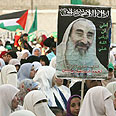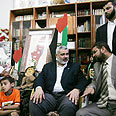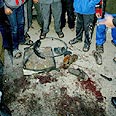


Hamas supporters marched through the streets of Gaza City Saturday to mark four years since the assassination of Sheikh Ahmed Yassin, the wheelchair-bound spiritual leader of the Islamist movement who was killed during an Israeli air strike on March 22, 2004.
Hamas leader Ismail Haniyeh paid a visit to Yassin's family home to meet with the slain sheikh's relatives.
Israel confirmed at the time that its helicopters fired several rockets at Yassin and his bodyguards as they were heading to a local mosque at 5:30 am. The sheikh was killed on the spot.

Wheelchair with photo of Sheikh Yassin (Photo: AFP)
Meanwhile, talks aimed at reconciling Hamas and Fatah continued in the Yemen capital of Sana'a Saturday, with Foreign Minister Abubakr al-Qirbi saying that "a final formula was reached and Fatah agreed to it ... Our brothers in the Hamas movement asked for an opportunity to consult their (leadership)."
Under the draft agreement from the Yemen-sponsored talks, Hamas and Fatah would agree to hold direct negotiations in early April about a Yemeni plan calling for the situation in the Gaza Strip to return to the way it was before Hamas took it over.
The issue has been a main point of contention, with Fatah demanding that Hamas Islamists give up control of the territory, which the group seized in June after routing Fatah forces.
A Hamas official said in response: "The main stumbling block is Fatah's insistence that Hamas cease its control of the Gaza Strip."
The Palestinian ambassador to Yemen, named by the Fatah-dominated Palestinian Authority, said Hamas was given until late Saturday to respond.
"The Yemenis have proposed a final version after consultation with (both Palestinian) delegations. Hamas asked for time for further consultations. The Yemenis gave them only until tonight," Ahmad Deek told Reuters by telephone, confirming that the Fatah team had accepted the plan.
The plan also envisages Palestinian elections, the creation of another unity government and a rebuilding of Palestinian security forces along national rather than factional lines.
In Gaza, Hamas leader Haniyeh expressed hope the talks would succeed.
"The talks have gone a good distance but there are some issues that need more discussions ... The Yemeni initiative is an agenda for dialogue and not items for immediate implementation. I hope the dialogue will reach a positive result," he said.















